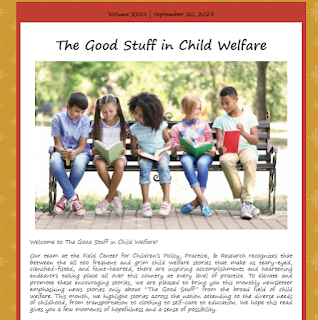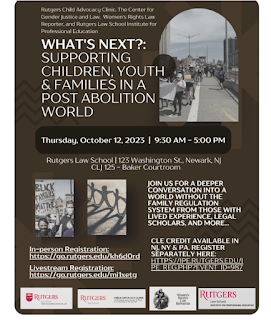This post will be a little more dense and assume more prior
knowledge on the part of readers than most.
That’s because it’s meant specifically for those who have read a study
concocted by a who’s who of family policing’s “caucus of denial” – those who claim
that, somehow, child welfare is magically immune from the racism that infects
every other aspect of American life.
I’ve taken to calling this caucus the Scooby Gang, because
of this slide that Prof. Deadric Williams uses in his lectures to characterize “scholars”
like them.

One of the members of the Scooby Gang, Brett Drake, has been
on something of a grand tour touting their latest study. This post is here now because, at this moment,
he is scheduled to try to sell his claims at the Kempe Center’s virtual
international conference. And he’ll be
taking the act to the University of Pennsylvania later this month.
This analysis gives Drake et al. every benefit of the doubt,
despite reason to question the underlying data used in the study – something I
will discuss later. But let’s assume,
for the moment, the raw data are correct.
The heart of their argument is this: Disparities in the rate
of family police involvement (a more accurate term than “child welfare”
involvement) are no greater, and slightly lower, for Black families than
disparities in other aspects of American life over which the family police
claim to have no control,* such as poverty, low education, infant mortality,
very low birthweight, etc. Therefore “child welfare” isn’t racist.
To which the only logical response is: Huh???
It’s not even clear what they’re getting at. At first, it seems like just a regurgitation
of the usual: “It’s not race, it’s poverty!” trope that family police
apologists have been using ever since racism in family policing finally started
to get the public attention it deserves.
(Before that, the family policing establishment denied they ever took
children because of poverty.)
But if that’s their argument, and they are saying
disproportionate substantiation of allegations against Black families and
removal of Black children is valid because they also are disproportionately
more likely to be poor, have less access to quality healthcare and education,
etc., then what they are saying is: poverty equals neglect and we should take
away people’s children because of it.
That’s bad enough, but it ignores all the studies showing racial
bias over and above the class bias.
It also dances around the fact that racism has something to
do with all those other factors. And
it’s quite a dance.
Here’s what they write:
Some may argue that because all harm indicators included
here (e.g., infant mortality, very low birthweight) are influenced by racism,
they are not objective and cannot be used as benchmarks. Our argument is
different; we argue that these indicators are external to CPS and thus, cannot
be caused by racially biased CPS decision-making. Thus, if mandatory reporters
or CPS caseworkers systematically targeted Black children with overreporting or
overintervention, disparities in CPS contact should be observably larger than
disparities in external indicators of risk and harm (regardless of the ultimate
cause of those disparities).
On the contrary. This
shows only that, as the authors admit, all those other factors are “influenced
by racism” and so is CPS decision-making!
If society as a whole is racist, why wouldn’t there be disparities
across the board?
A high bar for determining racial bias
The 15 authors also set up a straw man by saying their study
disproves the idea that “if mandatory reporters or CPS caseworkers
systematically targeted Black children…”
That suggests a very high bar for judging behavior as racist: By this standard, anything less than a
caseworker changing into a white sheet and hood to go burn a cross after work
isn’t racism. As even this overwhelmingly
white group of authors should know, that’s not how racism works.
In light of this it’s worth circling back to a complaint the
authors have about a study co-authored by abolitionist scholar Prof. Alan
Dettlaff. They write:
Only when [the authors] added a caseworker risk
assessment score to the model did the coefficient for Black race become larger
and statistically significant.
But, uh, that’s the whole point. Caseworker decisions are biased. So, the Scooby Gang’s complaint about Prof.
Dettlaff’s study is that only when they checked to see if caseworkers were
biased did they find that caseworkers were biased!
The authors do a lot of chest-thumping about how the legacy
of racism is a really bad thing and “racial inequity is real and
pervasive in our society and must be addressed far more aggressively” [emphasis
added]. Both claims imply that racism
itself is a thing of the past, however.
And, they emphasize, family police agencies really can’t be expected to
do anything about all these other bigger problems. They also say this:
To assert that these patterns, and the poverty and
chronic stress they perpetuate, would have no impact on behavioral and
psychosocial functioning among the individuals and families in those
neighborhoods is to reject decades of scientific consensus on human development.
In other words, past racism led to conditions that make
Black people bad parents, and since the family police can’t be expected to fix
any of that, we just have to go on taking away Black children.
Of course, there’s another possible conclusion: If you admit
that a “legacy” of racism causes poverty that in turn causes stress that in
turn causes some parents to lash out, and you admit that the solution is to
deal with poverty, and you admit that family police can’t deal with the actual
problem – which, again, you now admit is poverty – isn’t that a case for, um,
abolition?
At a minimum, it might be worth asking members of the Scooby
Gang what exactly they have done to make sure racial inequity is addressed “far
more aggressively.” How many members of
Congress have they met with about this?
What legislation have they proposed?
Have they taken part in any protest marches lately – or at least since
1963? Have they at least written to their legislators? If this is the centerpiece of the problem,
shouldn’t it be the centerpiece of their work?
The track record of several of the authors isn’t exactly
reassuring. Two of them, Sarah Font and
Emily Putnam-Hornstein, are part of a group that did indeed send a letter – a
letter rushing
to the defense of a self-proclaimed “race realist” law professor who pals
around with Tucker Carlson.
Putnam-Hornstein’s Twitter feed has become the
child welfare equivalent of Fox News and her prized predictive analytics
algorithm is
reportedly under investigation by the U.S. Department of Justice for bias
against the disabled. Font co-authored
a paper that labels every accused a “perpetrator” – even after they’ve been
found innocent, and she’s condemned the Indian Child Welfare Act. Another co-author, Richard Barth, is
following in Putnam-Hornstein’s footsteps, while turning
the whole concept of “evidence-based” on its head.
B.S. in, B.S. out
Drake et al.’s second claim is that once reported and
screened in for investigation, workers are no more likely, and possibly a
little less likely, to “substantiate” an allegation and place a child in foster
care when the family is Black than when the family is white. I question whether this is reliable based on
all the potential flaws in the database they use, something I’ll discuss below.
But if, in fact, that’s true there is a more likely
explanation:
We have seen that mandatory reporters are far more likely to
assume a child is “at risk” of “abuse” or “neglect” if the child is Black. Hotline screeners, who may well be able to
infer race from things like street address and other information from a caller,
are likely to do the same. So if they
are reporting and screening in a vastly larger proportion of bullshit reports
on Black families than on white families, it makes sense that at later stages
of the process, even biased caseworkers might not substantiate the same proportion
of reports on Black children or remove the same proportion of Black children.
Here’s a hypothetical example:
For every 100 screened-in reports about Black families, 90
are bullshit. Twenty are “substantiated”
– ten because they’re real, ten because the workers are biased.
For every 100 screened-in reports about white families
“only” 80 are bullshit – because the threshold for calling in a report on a
white family is higher. So 20 are
substantiated, all of them real.
The substantiation rate is the same, but that doesn’t mean
there’s no bias.
The limits of NCANDS
Finally, a note about the database the Scooby Gang used for
this study.
They use a database known as NCANDS for National Child Abuse
and Neglect Data System. This is a
voluntary database, and I am aware of no checks on what individual states
report and how they report it. NCANDS is
the only national source for data on reports and substantiation.
But for foster care entries, there is another, less
unreliable database, known as AFCARS, Adoption and Foster Care Analysis and
Reporting System. Providing information
to that database is mandatory, and there are specific definitions states are
supposed to follow.
In 2021, NCANDS
reported 156,576 entries into foster care.
But AFCARS
reported 206,812. The fact that
these figures are so different should be at least a huge yellow flag when it
comes to drawing sweeping conclusions based on NCANDS data. Studies of single states, if the states are
known for maintaining relatively reliable or at least consistent data, might be
more valid than this deeply flawed attempt at a national comparison.
*-In fact,
family policing often makes these outcomes worse, so in that sense family
police agencies do have control over them.





